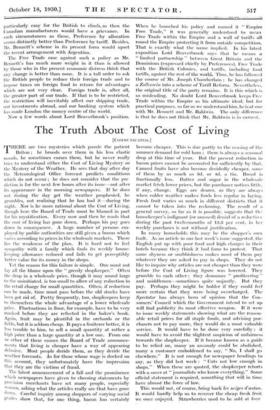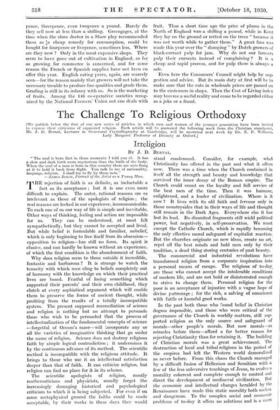The Truth About The Cost of Living
(COMMUNICATED.]
rlHERE are two mysteries which puzzle the patient Briton ; he broods over them in his less elastic moods, he sometimes curses them, but he never really tries to understand either the Cost of Living Mystery or the Mystery of the Weather. He sees that day after day the Meteorological Office forecast predicts conditions which do not occur ; he does not consider that the pre diction is for the next few hours after its issue—not after its appearance in the morning newspapers. If he does not during the clay get the weather prophesied, he grumbles, not realizing that he has had it—during the night. Nor is he more rational about the Cost of Living, though here the Board of Trade must be blamed in part for his mystification. Every now and then he reads that the cost of living has gone down. Perhaps his pay goes down in consequence. A large number of persons em- ployed by public authorities are still given a bonus which varies according to prices in the wholesale markets. There lies the weakness of the plan. It is hard not to feel sympathy with a family which finds its weekly house- keeping allowance reduced and fails to get perceptibly better value for its money in the shops.
Yet the reason for this failure is simple. One must not lay all the blame upon the " greedy shopkeeper." Often the drop in a wholesale price, though it may sound large to the uninitiated, is too small to allow of any reduction in the retail charge for small quantities. Often, if reduction can be made, time must pass before the old stocks have been got rid of. Pretty frequently, too, shopkeepers keep to themselves the whole advantage of a lower wholesale price. Fluctuations in flour, for example, have to be very marked before they arc reflected in the baker's book. Again, fruit may be plentiful in the orchards or the fields, but it is seldom cheap. It pays a fruiterer better, it is less trouble to him, to sell a small quantity at rather a high price than a large quantity at a low one. From one or other of these causes the Board of Trade announce- ments that living is cheaper have a way of appearing delusive. Most people deride them, as they deride the weather forecasts. As for those whose wage is docked on this account, they unfortunately have the impression that they are the victims of fraud.
The latest announcement of a fall and the prominence which newspapers have given to cheering statements by provision merchants have set many people, especially women, asking what the articles really are that have gone down. Careful inquiry among shoppers- of varying social grades show that, for one thing, bacon has certainly become cheaper. This is due partly to the ceasing of the summer demand for cold ham ; there is always a seasonal drop at this time of year. But the present reduction in bacon prices cannot be accounted for sufficiently by that. Canned fruits have also become decidedly cheaper, some of them by as much as 3d. or 4d. a tin. Bread is fractionally less. Butter and sugar in the wholesale market fetch lower prices, but the purchaser notices little, if any, change. Eggs are dearer, as they arc always when colder weather makes fowls less regular in laying. Fresh fruit varies so much in different districts that it cannot be taken into the reckoning. The result of a general survey, so far as it is possible, suggests that th3 housekeeper's indignant (or amused) denial of a reductio:1 during the past twelvemonths of 13.3 per cent. in her weekly purchases is not without justification.
In many households this may be the shopper's own fault. As an article in our last week's issue suggested, the English put up with poor food and high charges in their hotels because they think it bad form to protest. That same shyness or snobbishness makes most of them pay whatever they are asked to pay in shops. They do not like to inquire why articles are not cheaper than they were before the Cost of Living figure was lowered. They grumble to each other ; they denounce " profiteering " and middlemen—sometimes quite unjustly. But they pay. Perhaps they might be bolder if they could feel more certain that they were being overcharged. The Spectator has always been of opinion that the Con- sumers' Council which the Government intend to set up will find publicity its most effective weapon. If it were to issue weekly statements showing what are the reason- able retail prices for all staple foods, and advising pur- chasers not to pay more, they would do a most valuable service. It would have to be done very carefully ; it would have to avoid the slightest suspicion of unfairness towards the shopkeeper. If it became known as a guide to be relied on, many an anomaly could be abolished, many a customer emboldened to say, " No, I shall go elsewhere." It is not enough for newspaper headings to say, as they did last week : " Cuts not low enough in shops." When these are quoted, the shopkeeper retorts with a sneer at " journalists who know everything." Some official statement is required, something that will in time have almost the force of law.
This would not, of course, bring back les neiges d'antan. It would hardly help us to recover the cheap fresh fruit we once enjoyed. Strawberries used to be sold at four
pence, threepence, even twopence a pound. Rarely do they sell now at less than a shilling. Greengages, at the time when the slum doctor in a Shaw play recommended them as [a cheap remedy for consumption, could be bought for fourpence or fivepence, sometimes less. Where are they now ? Only in the most expensive shops. They seem to have gone out of cultivation in England, so far as growing. for commerce is concerned, and for some reason the French or Spanish supplies have not been on offer this year. English eating pears, again, are scarcely seen—for the reason mainly that growers will not take the necessary trouble to produce fine qualities and grade them. Grading is still in its infancy with us. So is the marketing of fruits. Among the IN co-operative societies recog- nized by the National Farmers' Union not one deals with fruit. Thus a short time ago the price of plums in the North of England ivat--a shilling a pound, while in Kent they lay on the ground or rotted on the trees " because it was not worth while to gather them." A great fuss was made this year over the " dumping " by Dutch growers of black-currant pulp for jam. Why do not our farmers pulp their currants instead of complaining ? It is a cheap and rapid process, and for pulp there is always a sale.
Even here the Consumers' Council might help by sug. gestion and advice. But its main duty at first will be to make sure that the cuts in wholesale prices are passed on to the customers in shops. Then the Cost of Living index may become a useful reality and cease to be regarded either as a joke or a fraud.

























































 Previous page
Previous page